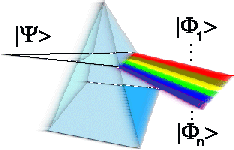Łukasz Zawitkowski, Mariusz Gajda, and Kazimierz Rzewski
We use the classical fields approximation to study a translational flow of the condensate with respect to the thermal cloud in a weakly interacting Bose gas confined in a three-dimensional box. We study both subcritical and supercritical relative velocity cases and analyze in detail a state of stationary flow which is reached in the dynamics. This state corresponds to the thermal equilibrium, which is characterized by the relative velocity of the condensate and the thermal cloud. We observe two processes—re-thermalization and drag, both of which lead to a reduction of a relative velocity of the superflow. Yet only the drag process, which is observed above the critical velocity vcr , results in transferring a Bose-Einstein condensate to a slower moving mode. In this case the relative velocity of the flow suddenly drops to a value close to zero. Finally, we report the critical velocity to be for our parameters vcr=0.21c for the initial condition and vcreq=0.12c for re-thermalized superflow ( c being the Landau speed of sound), which is strikingly lower than Landau critical velocity, yet consistent with experiments.
Phys. Rev. A vol. 74, 043601 - 1-7 (2006) [1/3]
Dec 8, 2005
Dec 1, 2005
Dynamics of quasisolitons in degenerate fermionic gases
Emilia Witkowska and Mirosław Brewczyk
We investigate the dynamics of the system of multiple bright and dark quasisolitons generated in a one-component ultracold Fermi gas via the phase imprinting technique in terms of atomic orbitals approach. In particular, we analyze the collision between two bright quasisolitons and find that quasisolitons are subject to the superposition principle.
Phys. Rev. A 72, 023606 (2005)
We investigate the dynamics of the system of multiple bright and dark quasisolitons generated in a one-component ultracold Fermi gas via the phase imprinting technique in terms of atomic orbitals approach. In particular, we analyze the collision between two bright quasisolitons and find that quasisolitons are subject to the superposition principle.
Phys. Rev. A 72, 023606 (2005)
Subscribe to:
Comments (Atom)
